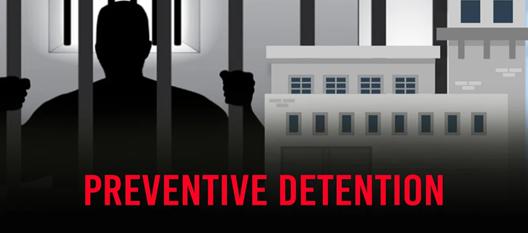Description

Copyright infringement not intended
In News
- The Supreme Court of India has raised concern that the provisions under preventive detention rules negatively affect personal liberty.
- The Supreme Court highlighted that protection provided under the Indian Constitution must be strictly followed.
- The Court stated that “preventive detention is designed to provide protection to society. Its object is not to punish a man for having done something but to intercept before he does it and to prevent him from doing”.

Preventive Detention
- Article 22 of the Indian Constitution grants protection to persons who are arrested or detained. Detention is of two types:
- Punitive detention
- Preventive detention
- Punitive detention is to punish a person for an offence committed by him after trial and conviction in a court.
- Preventive detention means the detention of a person without trial and conviction by a court.
- Its purpose is not to punish a person for a past offence but to prevent him from committing an offence in the near future. Thus, preventive detention is only a precautionary measure and it is based on suspicion.
- Article 22 of the Indian Constitution has two parts;
- One Part deals with the cases of ordinary law.
- The second part deals with the cases of preventive detention law.
- A person who is arrested or detained under ordinary law has the following rights:
- Right to be informed of the grounds of arrest.
- Right to consult and be defended by a legal practitioner.
- Right to be produced before a magistrate within 24 hours including the journey time.
- Right to be released after 24 hours unless the magistrate authorizes further detention.
- These above safeguards are not available to an enemy alien or a person arrested or detained under a preventive detention law.
- Article 22 also grants protection to persons who are arrested or detained under a preventive detention law. This protection is available to both citizens as well as aliens and includes the following:
- The detention of a person cannot exceed three months unless the advisory board reports sufficient cause for extended detention. The board is to consist of judges of a high court.
- The grounds of detention should be conveyed to the detained person However; the facts considered to be against the public interest need not be disclosed.
- The detained person should be allowed to make representation against the detention order.
- The Constitution authorized the Parliament to prescribe;
- The circumstances and the classes of cases in which a person can be detained for more than three months under a preventive detention law without obtaining the opinion of an advisory board.
- The maximum period for which a person can be detained in any case under a preventive detention law.
- Procedure to be followed by an advisory board in an inquiry.
- The Constitution has divided the legislative power related to preventive detention between the Parliament and the state legislatures.
- Both the Parliament and state legislatures can concurrently make a law on preventive detention.
- The Parliament has exclusive authority to make a law of preventive detention related to defence, foreign affairs and the security of India.
- State legislatures can make a law of preventive detention for reasons connected with the security of a state, the maintenance of public order and the maintenance of supplies and services essential to the community.
Concern
- Preventive detention is the act of detaining an individual who has not committed any wrong but on mere suspicion that he/she is likely to commit a crime in future.
- It Violates the right of personal liberty and fundamental rights.
Way Forward
- Article 3 of the Universal Declaration of Human Rights guarantees “the right to life, liberty, and security of person”. It says that detention must be carried out in conformity with the law, and not arbitrary.
- Preventive Detention must be according to the law, reasonable and also lawful.
- Detainees must have the right to be informed of the reasons for the arrest and the charges framed against them.
- The detainee must have the right to get a lawyer of his/her own choice.
- It is essential to have an independent body outside the control of the executive to determine the legality of preventive detention.
- Just like two faces of a coin, preventive detention also has its own merits and demerits. It is the responsibility of the legislature and executive to use it according to the law without shifting from the core value of the Indian Constitution.
https://indianexpress.com/article/india/preventive-detention-serious-invasion-of-personal-liberty-sc-8183553/
https://t.me/+hJqMV1O0se03Njk9













